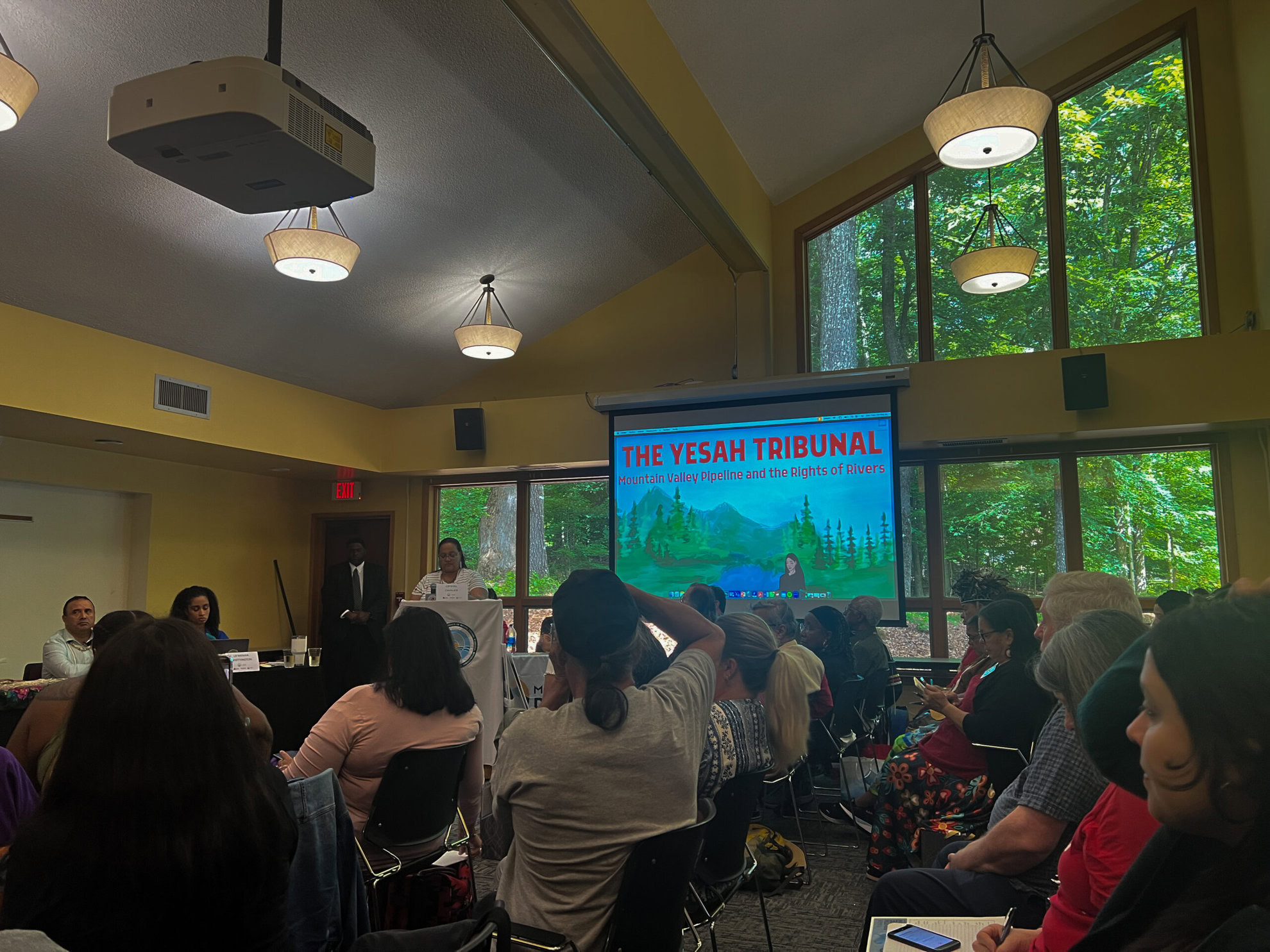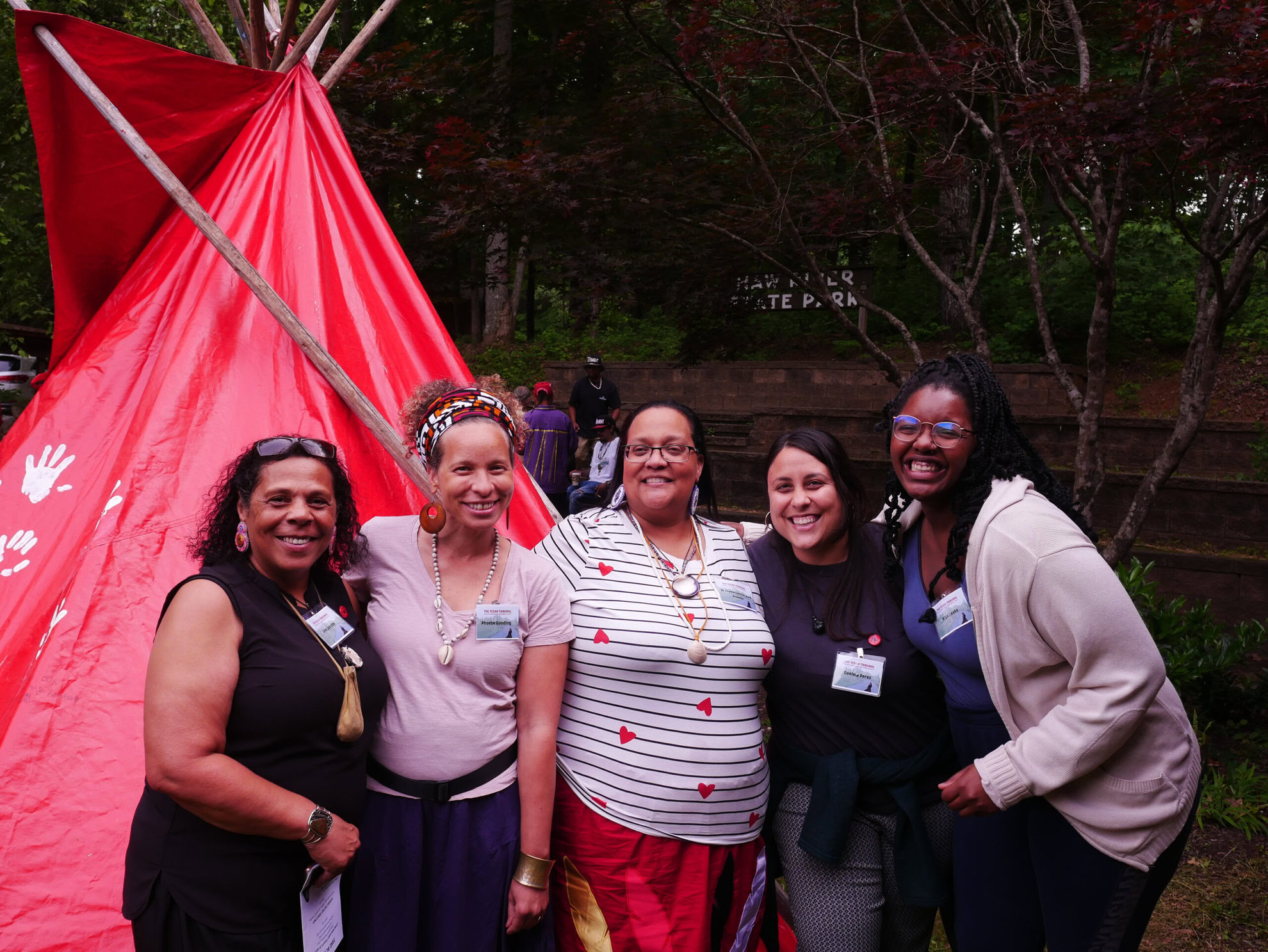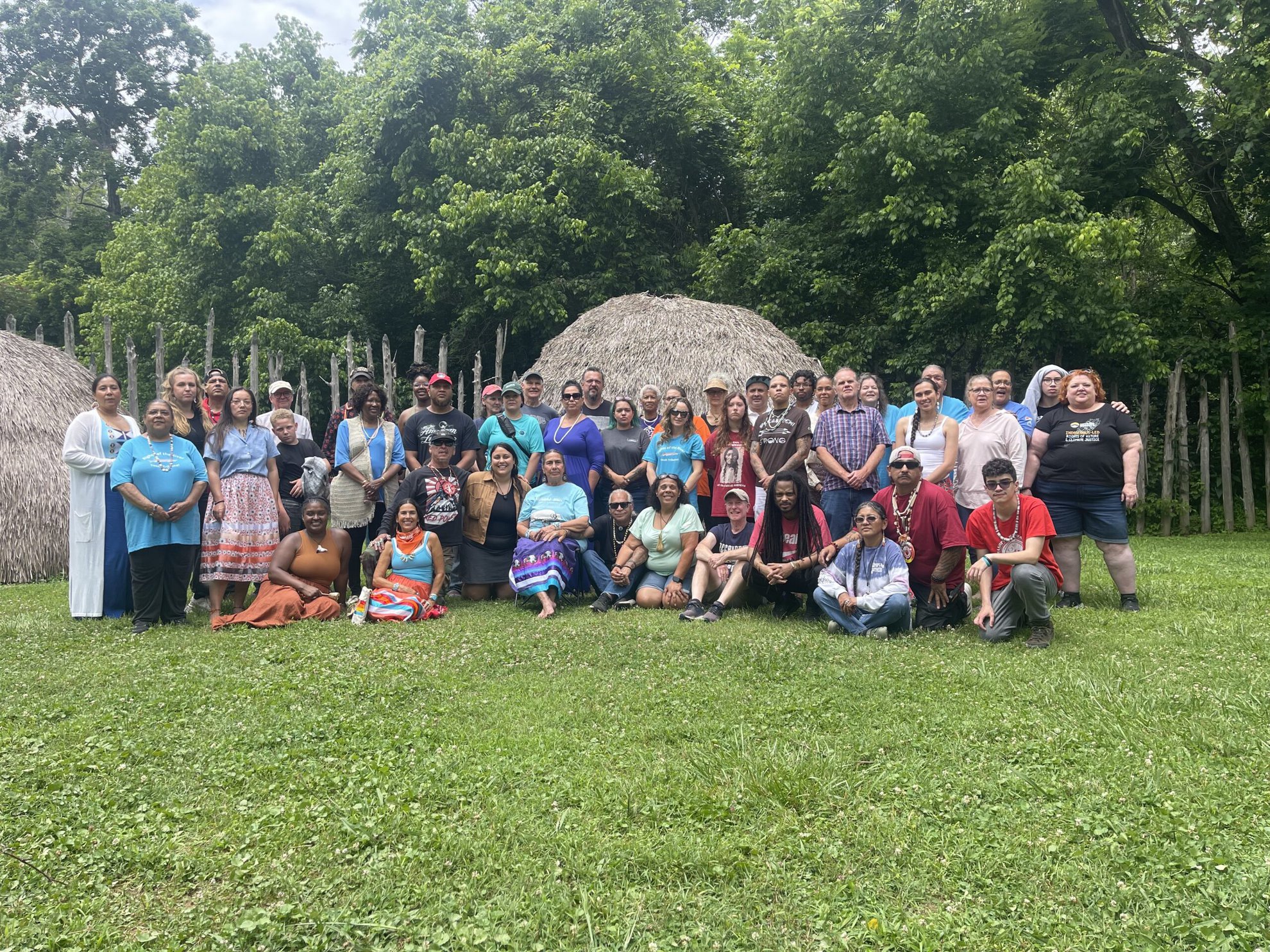A Call for Justice and the Rights of Nature: The Yesah Tribunal returns a verdict on the MVP
By Lauren Bowman Clontz, WEA Program + Operations Intern
Earlier this summer, on June 1st, a groundbreaking event took place in Rockingham County, North Carolina. An Indigenous-led tribunal brought verdicts against a fracked gas pipeline in southern Appalachia for crimes against nature. The Yesah Tribunal, consisting of a panel of five Indigenous judges, determined that the Mountain Valley Pipeline (MVP) violates the inherent rights of rivers, natural ecosystems, and Indigenous peoples. The tribunal called for the case to be elevated to the International Rights of Nature Tribunal, the United Nations, and federal, state, and local agencies for violation of laws such as the Endangered Species Act.
On the day of the tribunal, judges heard testimony from thirteen witnesses, including environmental experts, scientists, community members, farmers, and representatives from organizations such as Wild Virginia and West Virginia Rivers. Before delivering their final verdict, Judge Hartman Deetz gave the following statement: “MVP and government agencies have allowed the construction of a pipeline that does not meet health and safety guidelines. They would not allow the construction of a skyscraper on cement if it did not meet health and safety guidelines. MVP is clearly a violation of the absolute rights of the river.”
Crystal Cavalier-Keck (Occaneechi Band of the Saponi Nation), a WEA U.S. Grassroots Accelerator Leader and Case Presenter at the Yesah Tribunal, reflected on the event, “We had people attending from all across the United States and even Ecuador. It was really good energy. This event was the first of its kind. We…formed unity between [community members impacted by] the MVP mainline and the Southgate [extension project]. The witnesses had really powerful testimony, and it was really powerful to have the solidarity.”


Bringing stakeholders together
The Yesah Tribunal was hosted by 7 Directions of Service (7DS), and co-sponsored by Movement Rights, the Global Alliance for the Rights of Nature, and the International Rights of Nature Tribunal.
7DS is an Indigenous-led environmental justice and community organizing collective based on Occaneechi-Saponi homelands in rural North Carolina. Founded by Crystal Cavalier-Keck and her husband, Jason Crazy Bear Keck, 7DS focuses on stopping methane fracked gas infrastructure build outs, advocating for the legal Rights of Nature, and developing a land, language and cultural center based on traditional Yesah teachings.
Crystal is also the Chair of the Environmental Justice Committee for the NAACP and a board member of the Haw River Assembly. At the Yesah Tribunal, Crystal represented both 7DS as well as her community, which stands to be impacted by the MVP Southgate project. “We carry a responsibility to be a strong voice for the lands, waters, and more-than-human world,” she said in an interview with WEA. “We hope to stabilize the ecosystems and help the natural resources replenish themselves, but preserve this balance of life.”
The fast-tracking of a life-threatening pipeline
The Mountain Valley Pipeline (MVP) is designed to transport fracked gas overseas, spanning over 300 miles through steep mountain terrain from West Virginia to the southern border of Virginia. The MVP crosses more than 500 bodies of water, including sensitive wetlands and some of the largest unfragmented forests left in the eastern U.S. In June of 2023, Senator Joe Manchin added MVP provisions to an unrelated debt ceiling bill called the “Fiscal Responsibility Act,” fast-tracking the project and forcing executive agencies to issue permits for its completion. As of June 10, 2024, the MVP mainline was declared complete, despite having recently reported 130 unresolved potential problems to the Pipeline and Hazardous Materials Safety Administration (PHMSA).
The MVP Southgate extension project, announced in 2018, was originally slated to be 70+ miles from the mainline in Virginia into North Carolina, but construction on the project never began. The extension project was denied key permits and the company was unsuccessful in their attempts to acquire land through eminent domain in North Carolina. In December of 2023, the pipeline company announced new plans to reduce the extension to 31 miles, claiming to reduce the number of water crossings by altering the route.
In his witness testimony, Russell Chisholm, an impacted community member and the Co-Director of Protect Our Water, Heritage, Rights Coalition, stated, “We respectfully request that the Yesah Tribunal…make a formal request to members of the United States Congress to draft legislation to repeal Section 324 of the 2023 Fiscal Responsibility Act[.]. Additionally, due to the risks posed to all life, upstream, midstream, and downstream from MVP, we respectfully request the Tribunal urge the US House Committee on Transportation and Infrastructure to fully investigate whether MVP can ever be safely operated at full capacity considering the age and condition of the pipe[.]”
In their verdict, the Yesah Tribunal judges ruled that the MVP Southgate not be approved and called for a repeal of the 2023 Fiscal Responsibility Act.
A growing movement for the Rights of Nature
One of the fastest growing environmental justice movements in the world, The Rights of Nature establishes a new legal framework to address environmental issues by recognizing that nature has the right to exist, thrive, and evolve. As an Indigenous-led movement, it blends ancestral wisdom and traditional ecological knowledge with modern law and science to stabilize ecosystems and benefit future generations.
While not currently legally binding, Rights of Nature tribunals—formally created in 2014 by the Global Alliance for the Rights of Nature—aim to be integral to legal systems, providing a framework for courts and judges presiding over environmental cases by recommending actions for reparations, mitigation, restoration, and to prevent further damages
The Rights of Nature is quickly gaining traction in legal proceedings all over the world. One example is the landmark case between the Sauk-Suiattle Indian tribe and the city of Seattle, where the tribe sought a legal declaration from the city to create the “Rights of Salmon.” While the city ultimately did not agree to this request, they did provide passage for salmon around hydroelectric dams on the Skagit River. Another example is the Lake Erie Bill of Rights in 2019, in which residents of Toledo, OH voted to grant Lake Erie legal rights to “exist, flourish, and naturally evolve.” This was one of the first times that legal rights were granted to a natural resource in the U.S., though the bill was ultimately struck down by a federal judge in 2020. There are other examples of municipalities and townships in the U.S. that have recognized the Rights of Nature through local ordinances, provisions, and a Community Bill of Rights, but as of today no U.S. court has ever upheld the Rights of Nature as law.
Crystal Cavalier-Keck emphasized, “The judicial system…was created to help governments and corporations [and historically benefited white people]. Now, we're starting to build a solidarity movement of all people working together to unite for the common good of humanity.”

What happens next?
The Yesah Tribunal was just the beginning. Crystal alludes to the broader impact of the event, stating, “What comes next is advocating for this to be heard at Climate Week in New York. We're hoping that the Global Alliance for the Rights of Nature and the International Tribunal will take [this case] up, and we will be able to present this on the international level to let them know that this is how corporations work, these are the frontline communities that it's affecting.”
She underscores the importance of community education and involvement, “We are building alliances. We are building this movement, and we're asking people to join us. And we're educating people to work in their own communities because we don't want to go into those communities and tell them what we think is best.” Crystal goes on to explain, “If that community decides that they want to settle with the pipeline, then they need to understand what a community benefit agreement is, and how it’s going to help you now versus in the future.”
What we can all do
The Tribunal Report and Media Toolkit provided by 7DS after the Yesah Tribunal provides actionable steps that individuals can take to support the Rights of Nature movement, including:
- Rewatching & sharing the Tribunal livestream, resources in this toolkit
- Learning more about Indigenous Rights of Nature
- Learning more about global Rights of Nature tribunals
- Using the Stop MVP Toolkit to demand safety and accountability at this critical time
Crystal urges us all to learn as much as we can, and to always protect our waters. “At the end of the day, you cannot live without it. Governments look at things [such as water] as commodities. When that water is gone and you can't clean it, what are we going to do then? It's too late. When you don't have clean water, you will cease to exist.”
